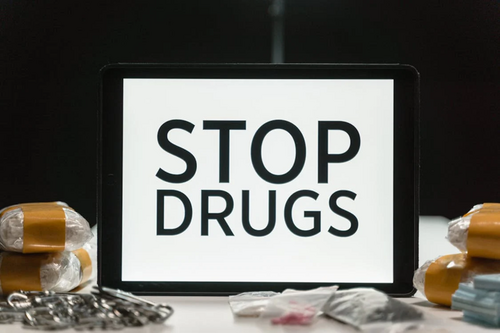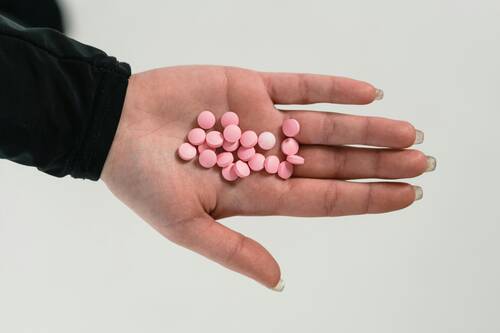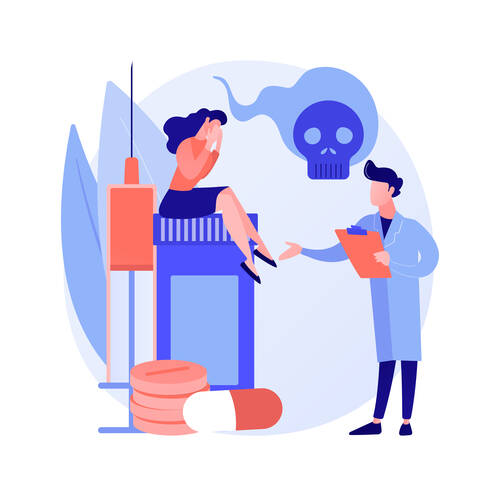How to Make Informed Health Decisions for Better Well-Being
Understand Your Health Needs
Everyone’s health journey is different. Some people may be managing a chronic condition, while others want to stay on top of their general wellness. The first step in making informed decisions is to take time to understand your own health needs. That might include knowing your family history, keeping track of any symptoms you have, or noticing changes in your mood, energy, or physical health. When you are more aware of how you feel day to day, it becomes easier to spot when something needs attention. You should also think about your lifestyle. Do you get enough sleep? Are you eating balanced meals? Do you feel stressed all the time? These things all play a role in your overall health. (more…)Navigating Life After Addiction: Steps Towards Healing and Renewal
 Navigating life during this phase means adopting new habits, promoting a strong support system, and prioritizing mental and emotional well-being. This article will explore all the essential steps toward healing and recovery for those who have overcome the addiction challenge and are striving to build a fulfilling life.
Navigating life during this phase means adopting new habits, promoting a strong support system, and prioritizing mental and emotional well-being. This article will explore all the essential steps toward healing and recovery for those who have overcome the addiction challenge and are striving to build a fulfilling life.
Acknowledging the Journey Away from Drug Abuse
Are you going through drug addiction recovery? Taking a step back and recognizing how far you have come is essential. Drug or alcohol addiction is a struggle. To overcome it, intense efforts and dedication are required. By acknowledging your progress, you can build confidence and maintain motivation. It is important to celebrate milestones throughout your journey. Whether it is one month, six months, or one year of sobriety, they serve as reminders of personal growth and resilience. (more…)Luxury Rehab Clinic in St Helens
Transforming Recovery: The Impact of Addiction Treatment Technology
 Research has shown that when technology-based interventions are designed using evidence-based behavioral and multimedia learning principles, they can significantly improve treatment outcomes. By offering new ways to assess, prevent, and treat addiction, these tools are enhancing traditional treatment programs and expanding the reach of recovery support systems.
Moreover, technology allows for more personalized care, enabling individuals to access resources and guidance whenever and wherever they need it. This article will explore how various technological advancements are improving addiction treatment and what the latest research reveals about their effectiveness.
Research has shown that when technology-based interventions are designed using evidence-based behavioral and multimedia learning principles, they can significantly improve treatment outcomes. By offering new ways to assess, prevent, and treat addiction, these tools are enhancing traditional treatment programs and expanding the reach of recovery support systems.
Moreover, technology allows for more personalized care, enabling individuals to access resources and guidance whenever and wherever they need it. This article will explore how various technological advancements are improving addiction treatment and what the latest research reveals about their effectiveness.
What Is Substance Use Treatment?
Substance use treatment refers to the comprehensive process of helping individuals recover from addiction to drugs, alcohol, or other harmful substances. This treatment aims to eliminate or reduce substance use, address the underlying causes of addiction, and equip individuals with the tools and skills needed to maintain long-term recovery. Effective substance use treatment is designed to improve overall well-being, including mental health, physical health, social relationships, and quality of life. (more…)Recognizing the Signs of Alcoholism: A Guide to Understanding Symptoms
- Drinking alcohol in larger amounts or over a longer period than intended.
- Craving alcohol.
- Developing a tolerance, requiring more alcohol to achieve the same effects.
- Suffering from withdrawal symptoms when not drinking.
- Neglecting responsibilities at work, home, or school due to drinking behavior.
- Engaging in risky behaviors while under the influence, such as driving or unsafe sexual activity.
Understanding Alcohol Use Disorder
Alcohol use disorder is a medical condition formally recognized in the Diagnostic and Statistical Manual of Mental Disorders (DSM-5). It encompasses a spectrum of problematic drinking habits, ranging from mild to severe. People with AUD often struggle with an impaired ability to control their alcohol consumption, even when facing health problems or damage to relationships. Heavy drinking and frequent binge episodes, defined as consuming five or more drinks for men or four or more for women in about two hours, poses a significantly increased risk of developing AUD. Family history of substance abuse or mental disorders also raises susceptibility. (more…)How to Balance Work, Life, and Recovery in a Palm Springs Sober Living Home
Whether you’re attending meetings, exploring the desert landscape, or simply enjoying the peace of your sober living home, every small...
The Role of Genetics in Substance Use Vulnerability and Recovery
Genetic Factors in Addiction Risk
Research indicates a significant link between genetics and the risk of developing substance use disorders. Genes play an impactful role, contributing to approximately 40-60% of the predisposition to addiction. Certain gene variations, such as those found in dopamine receptor genes, can enhance this likelihood. The presence of similar disorders in a family history can point to a potential genetic predisposition. This genetic influence is prominently observed in substance dependencies like alcohol and nicotine. Nevertheless, the role of environmental factors in interacting with these genetic risks mustn't be neglected. Gaining an understanding of the interplay between genetics and addiction contributes to our knowledge of this multifaceted matter. (more…)Overcoming Stigma: Why Seeking Drug Rehab is a Sign of Strength
Breaking the Silence: Sharing Success Stories to Inspire Change
One of the most potent ways to combat the stigma of drug rehab is through the sharing of success stories. These narratives of triumph offer hope, shatter misconceptions and illuminate the realities of addiction and recovery. Each story underscores the transformative power of rehabilitation and the resilience inherent in the human spirit. Success stories serve as a beacon for those who are still hesitant to seek help. By highlighting the journey of those who have walked the path of recovery, individuals can find the encouragement and motivation to empower themselves. It is an acknowledgment that while addiction is a part of their story, it does not define their entire identity or their future. A New Found Life reclaimed through the process of drug rehab, carries with it invaluable lessons and experiences. In sharing these journeys, those in recovery can challenge prevailing biases and illustrate that rehabilitation and a return to a fulfilling life are within reach. Celebrating these victories amplifies the message that recovery is possible and worthy of pursuit. (more…)The Importance of Medically Supervised Drug Detox Treatment
Long-term recovery outcomes improve when detox is conducted under medical supervision. Proper stabilization enhances the transition into rehabilitation programs, increasing...
Teen Rehab: How Social Media Addiction and Substance Abuse Are Linked
The Unspoken Link Between Social Media and Addiction
Teenagers are very sensitive; hence, social media is a main influence weapon. Studies reveal that overuse of screens could cause mental problems like poor self-esteem, anxiety, and sadness. However, the connection between drug use and social media addiction goes well beyond what most individuals would consider. These two are connected, thus:- Contact with Substance Abuse
- Online challenges and peer pressure
- Mental Health Decline Producing Self-Medication
- Dopamine Demand and Enhanced Addiction Risk
Addiction Recovery and Brain Health: The Role of Sober Living in Neurological Healing
The Brain’s Recovery Process After Addiction
Substance use alters the brain’s reward system by overstimulating dopamine production, leading to cravings and dependency. Prolonged use also damages the prefrontal cortex, which governs rational thinking and impulse control. Even after stopping substance use, the brain needs time to repair these functions, and the right environment is key to facilitating this process. Early recovery is often marked by post-acute withdrawal syndrome (PAWS), which can include mood swings, anxiety, and cognitive fog. Research shows that a stable living environment can help reduce these symptoms by providing consistency and reducing exposure to triggers. Without external stressors like unsafe housing or exposure to substance use, the brain can focus on healing neural pathways and restoring equilibrium. (more…)Hills Recovery: The Healing Power of Being Heard
 For many who turn to alcohol or drugs, the deeper problem lies in feeling ignored or misunderstood.
In this heartfelt video segment, Vanessa highlights, “Most people who turn to alcohol and drugs to cope… they’ve never really had a sounding board.” This statement captures the profound loneliness that can exacerbate addictive behaviors.
When individuals finally encounter a place where sharing is encouraged and valued, the impact can be transformative. The weight of shame and isolation begins to lift when someone feels truly listened to. This newfound sense of validation can, in turn, become the catalyst for more profound emotional healing.
(more…)
For many who turn to alcohol or drugs, the deeper problem lies in feeling ignored or misunderstood.
In this heartfelt video segment, Vanessa highlights, “Most people who turn to alcohol and drugs to cope… they’ve never really had a sounding board.” This statement captures the profound loneliness that can exacerbate addictive behaviors.
When individuals finally encounter a place where sharing is encouraged and valued, the impact can be transformative. The weight of shame and isolation begins to lift when someone feels truly listened to. This newfound sense of validation can, in turn, become the catalyst for more profound emotional healing.
(more…)Understanding Insurance and Addiction Treatment
Drafting a well-informed appeal letter is often the first step in challenging a denial. Your appeal should include evidence of...
Drug Detoxification Process: What Happens in the Body?
What is Drug Detoxification?
Drug detoxification, or detox, is the process by which the body eliminates the harmful substances accumulated through drug use. Detoxification isn't just about stopping drug intake; it's the natural, biochemical process that the body undergoes to clear these substances from the bloodstream and tissues, restoring balance. While detox can be done at home in some cases, medical supervision is often essential, especially when withdrawing from substances like alcohol, opioids, or benzodiazepines. Withdrawal symptoms can range from mild to life-threatening, depending on the drug, the duration of use, and the individual's health. (more…)What Types of Rehabs Are Out There, and How Do You Choose the Right One?
Exploring The Benefits Of Group Therapy For Addiction Recovery
One of the primary roles of a facilitator or therapist is to steer the conversation in a positive direction. They...
How Sleep Plays a Critical Role in Mental Health and Addiction Treatment
Sleep is not just a time for rest but an important part of mental health and addiction recovery. Indeed, the...
Unlocking Your Potential: Strategies for Remaking Your Life After Addiction
Establishing a Supportive Network for Lasting Change
Surrounding oneself with a positive and encouraging support network is invaluable during the recovery process. The journey can be laden with challenges, and having reliable individuals, such as family, friends, and mentors – who offer understanding and support makes a considerable difference. These relationships create a safety net, reducing feelings of isolation and providing motivation on difficult days. Joining a community of peers who have undergone similar experiences can be tremendously reassuring. Participation in group therapy or support meetings facilitates shared experiences and strategies for coping with the rollercoaster of emotions and stressors. Such camaraderie not only aids in prevention of relapse but also enhances the sense of belonging and purpose in one’s transitional phase. Effective support networks extend beyond personal relationships. Associations with a professional team, including therapists, counselors, and medical professionals, can ensure that individuals receive the guidance and care they need for their unique situations. Engaging with a Texas drug and alcohol rehab can connect one with an informed community invested in their recovery success. (more…)Transforming Lives with Professional Addiction Recovery Services: A Holistic Path to Healing
- If you or someone you know is struggling or in crisis, help is available. Call or text 988 or chat at org. To learn how to get support for mental health, drug or alcohol conditions, visit FindSupport.gov. If you are ready to locate a treatment facility or provider, you can go directly to FindTreatment.govor call 800-662-HELP (4357).
- S. veterans or service members who are in crisis can call 988 and then press “1” for the Veterans Crisis Line. Or text 838255. Or chat online.
- The Suicide & Crisis Lifeline in the U.S. has a Spanish language phone line at 1-888-628-9454 (toll-free).
- Addiction recovery requires a comprehensive and personalized approach.
- Holistic healing practices can greatly enhance recovery outcomes.
- Data and research suggest that integrated treatment plans are most effective.
- Understanding Addiction
- The Importance of Professional Help
- Holistic Healing Methods in Recovery
- Benefits of an Integrated Approach
- Latest Research and Trends in Addiction Recovery
- Building a Strong Support System
- Future of Addiction Recovery
Hope, Healing, and Health: What Happens at an Alcohol Rehab
The First Step: Admission and Assessment
The journey begins with an initial assessment. You might be wondering, why is this necessary? Well, everyone’s experience with alcohol addiction is different. The team needs to know your history, your health, and your personal struggles with alcohol. This isn’t about judging you; it’s about understanding you. During this stage at your chosen alcohol rehab, you'll meet with medical professionals or counsellors who’ll ask questions about your drinking habits, physical health, and mental well-being. They’ll also screen for any underlying conditions, like anxiety or depression, which can often go hand-in-hand with addiction. It’s a chance to build a picture of what support you need. This is also where your treatment plan takes shape. Think of it like a roadmap tailored specifically to you. Whether you need a medically supervised detox, therapy sessions, or ongoing support, the team will plan it all out. (more…)7 Reasons People Choose Drug Rehab and Succeed in Recovery
1. A Fresh Start with Professional Support
One of the biggest reasons people turn to the likes of this drug rehab in Northern California is for expert guidance. Addiction is complex, and navigating recovery alone can feel overwhelming. Rehab centers offer a team of trained professionals—therapists, counselors, and medical staff—who know how to address both the physical and emotional challenges of addiction. Having this kind of specialized care isn’t just helpful; it’s life-changing. You’ll have a plan tailored to your specific needs, ensuring that no aspect of recovery is overlooked. When you’re dealing with something as serious as addiction, wouldn’t you want the best possible help? Rehab provides a safe environment where you can focus entirely on getting better, with experts who understand exactly what you’re going through. (more…)Navigating Chronic Pain Without Relapse: A Guide for Those in Recovery
Building a Strong Foundation: Communication with Healthcare Providers
Open communication with healthcare providers is essential in building a safe pain management plan. It’s important for individuals in recovery to disclose their addiction history to all medical professionals involved in their care. This disclosure enables healthcare providers to prioritize non-addictive treatments and monitor for potential relapse risks. Patients can also benefit from asking providers about alternative, non-opioid medications that can help manage their pain. Options such as anti-inflammatory drugs, muscle relaxants, or nerve-blocking medications can provide relief without the addictive risks. If opioids are unavoidable in some cases, discussing the lowest effective dosage and shortest duration can help minimize risks. (more…)Why Finding the Right Addiction Treatment Can Save Lives
Why Personalisation Matters in Addiction Treatment
Have you ever tried a one-size-fits-all approach to anything and thought, “This doesn’t feel right for me”? Addiction treatment works the same way. People struggling with addiction come from all walks of life, each with their own story, challenges, and needs. A generic program might tick some boxes, but personalised Asheville addiction treatment is where real change can happen. For example, someone with underlying mental health issues like anxiety or depression may need dual-diagnosis treatment, which addresses both the addiction and the mental health condition. Similarly, those with a history of trauma might benefit from therapies that specifically target those experiences. By tailoring treatment to the individual, the chances of long-term success increase dramatically. It’s not just about treating addiction—it’s about treating the person as a whole. (more…)Is Your Loved One Struggling From an Addiction? Everything You Need to Know About Dual Diagnosis
How CEOs and Entrepreneurs Deal with Mental Health and Addiction Problems
The Mental Health Crisis Among Leaders
The entrepreneurial journey is exhilarating but fraught with stress. Studies show that entrepreneurs are more likely to experience mental health challenges than the general population. According to research published in Small Business Economics, entrepreneurs report higher rates of anxiety, depression, and burnout. Similarly, executives often feel isolated, with the burden of responsibility leaving little room for vulnerability or support systems. Some of the key contributors to mental health struggles among leaders include:- Work-life imbalance: Long hours and the constant drive for success often leave little time for family, hobbies, or self-care.
- Financial pressure: Entrepreneurs frequently face financial uncertainty, which can exacerbate stress and anxiety.
- Decision fatigue: The relentless demand for critical decisions can lead to mental exhaustion.
- Isolation: Many CEOs and founders feel they cannot share their struggles with others, fearing it might undermine their authority or brand.
The Causes of Alcohol Addiction Explored Through Key Theories
Building a Support System for Successful Rehab and Recovery
- Accountability – Your support system helps you stay true to your recovery goals by keeping you on track.
- Encouragement – Positive reinforcement can push you through tough times, reminding you why you started this journey.
- Emotional resilience – Supportive relationships provide a safe space to express fears, doubts, and triumphs.
- Practical help – Whether it’s attending appointments, providing a listening ear, or helping you establish a routine, your network can assist in concrete ways.
- A sense of belonging – Feeling connected to others who care about your success reduces loneliness and strengthens your resolve.
Post-Acute Withdrawal Syndrome (PAWS): What to Expect After Detox
What to Know About the Detoxing From Drug and Alcohol Dependence
Detoxing from addictive substances is a critical initial step in recovery from drug and alcohol dependence. During this stage, the body begins to clear itself of toxins, but the process can come with a range of intense withdrawal symptoms. Understanding these symptoms—and how they evolve from the acute to the post-acute phase—can help individuals prepare for the detox journey and know when to seek help.
Common Withdrawal Symptoms
The acute withdrawal phase typically occurs within hours to days after ceasing substance use and often includes severe physical and psychological symptoms as the body struggles to adapt without the substance. During this phase, common withdrawal symptoms include:- Anxiety and panic attacks: Heightened anxiety levels and even panic attacks are common as the central nervous system adjusts to the absence of the substance.
- Nausea and Vomiting: These symptoms often accompany withdrawal, especially for those dependent on opioids and alcohol.
- Sweating and Shaking: As the body tries to restore balance, sweating and shaking can be intense, particularly for individuals detoxing from alcohol or benzodiazepines.
- Muscle Aches: Body aches and muscle cramps may occur as the body adjusts to functioning without the substance.
- Insomnia or Impaired Sleep: Insomnia is common, with some individuals experiencing vivid dreams or night sweats as their sleep cycles are disrupted.
While these acute withdrawal symptoms generally subside within a week, recovery is rarely immediate. Instead, individuals often transition into a post acute withdrawal period, where symptoms like mood swings, fatigue, and cravings may persist for months, creating what is known as a protracted withdrawal experience. (more…)
The Connection Between Sobriety and Mental Health: A Supportive Guide
Sobriety not only affects your mind but also your entire body. When an individual stops using substances like drugs and...





























